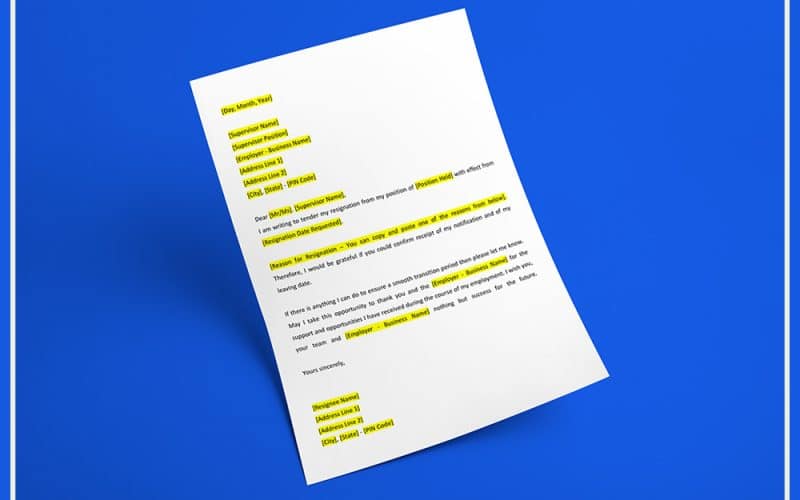It is proper protocol to give your employer a formal resignation letter for their records when you are leaving your job. Even if you’ve already discussed your resignation with your boss or human resources, you can still formally announce it in a letter. Your employment termination date is also confirmed.
As a courtesy, writing a letter of resignation as an employee can also help you keep good relations with your employer, which are necessary if you intend to use them as references and keep in touch with them for networking. In this article, we will be given you every single detail you need on an employee resignation letter and its guide.
What is a Resignation Letter?
When an employee decides to leave a job, they should provide their employer with a formal letter of resignation. A job resignation letter is a formal announcement of an employee’s exit strategy.
“It is a compulsory document that forms part of your staff records, Think of it as your old company’s last chapter of your story.”
Your letter should have a neutral tone that informs your employer that you are leaving and on what date, plus it should offer to aid in the transition to someone new and thank them for the time you were part of the team. Whatever your feelings about your job or your boss, being professional, pleasant, and helpful provides closure and a healthy route forward.
Tips for Composing a Resignation Letter
Here are a few tips for composing a resignation letter as an employee:
#1. Give Appropriate Notice
It’s best to give your boss two weeks’ notice if you are resigning. If at all feasible, draft the letter at least two weeks before you decide to leave your position. The day you intend to depart the organization should be mentioned in your resignation letter as it is vital information. This facilitates the move for both you and the company. Early on in the letter, mention this date.
#2. Thank You
Also, you ought to express your gratitude to the employer for the opportunity. You can keep this expression of gratitude brief if you weren’t really satisfied with your time spent working there or if you had a tense working relationship with your manager or other employees. Saying “I’ve liked my time at XYZ company” or “My two years at XYZ company have been a pleasure” is sufficient.
#3. Offer to Assist
Offer to help the employer find a successor. This assistance can take the shape of hiring or training a new worker. Also, you can offer to create transitional paperwork or provide your personal email address in case someone needs it after you’ve left the company. Your level of generosity is entirely up to you.
#4. Make Inquiries
Include any queries you may have in your letter, such as where to leave work-related materials or concerns you have regarding your benefits.
#5. Don’t Complain or Rant
It is inappropriate to vent your frustrations about coworkers, supervisors, or the business in your resignation letter. Remember that the persons who will read this letter may need to serve as references for you in the future, so be courteous.
#6. Write a Brief Letter
A resignation letter needs to be direct, concise, and easy to read. Keep the letter professional and avoid getting personal by not going into detail about why you are leaving.
Employee Resignation Letter Example
Dear Mr. Wilson Scort
I’m writing to formally inform you that, effective of 30th September, I will no longer be serving as office manager for Ken and Keets Financial Partners.
I recently received a job offer to work as an executive assistant at a small business, and after giving it some thought, I’m eager to take this next step in my professional development.
I’m tremendously appreciative of the opportunity I’ve had over the past four years working on the Operations team. Working for such a great organization and contributing to Ken and Keets’ objective to better support older employees financially has been a wonderful experience.
If there is any way I can help with this transition, kindly let me know. I appreciate all of your advice. Best of luck to you, and I look forward to staying in touch.
Sincerely,
Smith Julie
Professional Employee Resignation Letter
Tips for Professional Resignation
#1. Get Familiar with Your Company’s Rules
Two weeks’ notice is the professional minimum. Although this is not mandatory, it is a standard that prevents workplaces from becoming chaotic in the event of a leave. Learn about your company’s notification procedures before expressing your intention to depart. Try to follow the rules.
#2. Let Your Employer know
It’s typically preferable to deliver the news face-to-face and to include the resignation letter as supporting documentation. Announcing plans to quit a job is a common, even thrilling, stage of the professional cycle, despite the fact that it can be a difficult talk. Just make an effort to be concise and kind, and do not feel guilty for choosing to move on.
#3. Obey Orders from Your Boss
For the interim period, try to comply with requests from the employer. Other projects or training goals may have higher priority chores that need to be completed before the deadline.
#4. Get a Letter of Recommendation for Potential Employment
In the professional arena, professional recommendations are a valuable commodity. Nothing promotes a job prospect for a position more effectively than the recommendation of a previous manager, notwithstanding what a polished cover letter and résumé may do.
Resignation Letter Word Format
455 Pennsgrove Street,
Williams Elizabeth
215-545-9922 or Williamselizabeth@gmail.com
Philadelphia, Pennsylvania 19434.
8th of July 2010
U.S. Customs and Border Protection Mary Tezak Chief of Staff N 2nd St & Chestnut St #102 Philadelphia, PA 19102
Greetings, Ms. Zark
This letter is to let you know that I’ve decided to leave the Company. My employment with the company will end on Thursday, August 30, 2011.
I appreciate the support you have given me over the years and the duties you have so confidently given me. I have learned a lot throughout my time at the company, and I am really impressed with your administrative prowess.
If there is anything I can do to make this move go more smoothly, kindly let me know.
Respectfully,
[Signature]Williams Elizabeth
Resignation Letter Email
Use a subject line like “leaving the company” or “important update” in an email to inform your coworkers or team members of your resignation. You could use a subject line like “goodbye and good luck” if you have a particularly close relationship with your team.
examples of subject lines for resignation emails
Resignation, [Name]
Resignation [Name] – Resignation Email Resignation [Name]
I’m quitting my job at [Company Name]; I’m quitting my position at [Company Name].
I’ve made the decision to move on after much consideration. A new adventure awaits.
Goodbye and luck, everyone.
How to Format an Email of Resignation
It’s not difficult to write resignation emails, which can even be therapeutic. It’s a way to bid your current job farewell and begin the next leg of your career path.
A formal resignation letter should always be written with professionalism and deference. You never know when you might need your current employer again, so you don’t want to burn any bridges.
Keep your resignation email to a minimum. This is not the time to complain or vent about your current employer or job. Simply announce your resignation and include the date on which it will take effect.
Examples of and Templates for Resignation Emails
email templates for formal resignation
Subject: I’ve Resigned
Dear [Name of Employer],
I just wanted to let you know that I’ve chosen to leave the company and my employment there. I appreciate the chance to work here; I’ve learned a lot, and it’s been an honor to be a part of the team.
I’m excited to begin my new adventure and will be leaving on [date]. Please let me know if there is anything else I can do for you before I depart.
once more, I appreciate everything.
(Your Name)
How do You Write an Employment Resignation Letter?
A resignation letter should generally be formatted as follows:
#1 The Date and Salutation
The date and a professional salutation to your manager should appear at the top of your letter.
#2. Statement for Your Resignation
A statement of resignation should include the role you’re leaving and the date you’ll be departing in the first paragraph. This is referred to as a resignation statement.
#3. Body paragraph
You can thank the company for the opportunity to work there and discuss your leave strategy here. Although it is optional, you might include your contact information in the final paragraph. If you intend to utilize your former employer as a reference, this is highly advised.
How do I Write a Short Resignation Letter?
#1. Informing Your Management of Your Plans to Resign
It is always a smarter move to inform your manager of your plans. Any strained relations between you and your employer might be eased by a friendly arrangement reached by both parties. Also, it gives you a chance to receive the benefits and business certifications for which you are eligible.
#2. Using a Formal Business Letter Format
It is best to use a formal business letter format when writing your resignation letter. It shows that you made an effort, even while composing a resignation letter. A conscientious employee is a catalyst for corporate expansion. Do not use a phrase in the letter that may mar your reputation as being uncultured or unprofessional. Respect is a quality, not a right.
#3. Keep a Formal Tone
Do not forget that the management, not your neighbor, is the recipient of the letter. Keep your language and tone appropriate. It is not in your best interest to damage your reputation by speaking in an unfavorable manner.
#4. Salutation
If it begins suddenly with your departure, is that a really reassuring read? Although it is your first priority, it is appropriate to include a quick introduction to introduce the details. Bear in mind the slight differences between the better and the best. Now, can you see it?
Conclusion
It can feel risky to leave your work, so we all want to make the process as easy as possible. After all, you want your employer to provide you with a good recommendation in the future. “The best and safest course of action is to simply leave your position and state, “I’m going on, thanks for the chance.
Related Articles
- HOW TO WRITE A RESIGNATION LETTER: What You Should Say and Not Say
- RESIGNATION LETTER: Best Way to Write a Resignation Later
- 2 WEEK NOTICE LETTER: How to Write Resignation Letters (+Free Samples)
- HOW TO WRITE A TWO WEEK NOTICE: Tips + Examples
- CONSTRUCTIVE DISCHARGE: What It Is






